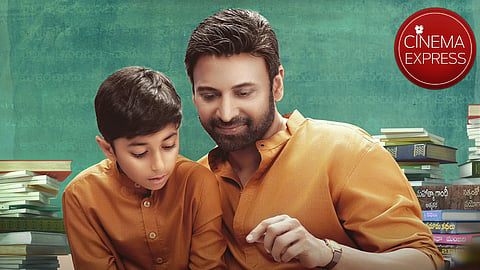Anaganaga review: A heartfelt lesson in empathy
Anaganaga movie review(3 / 5)
Some films arrive with so much heart that even their flaws start to feel oddly charming. Anaganaga, a film which is currently streaming on ETV Win, is one such offering. Built around the enduring premise of a progressive teacher fighting the archaic education system, the film doesn’t reinvent the wheel. It doesn’t try to. But its intention is clear, its empathy is sincere, and most importantly, it understands that stories can sometimes do what systems cannot — reach a child’s soul.
Director: Sunny Sanjay
Cast: Sumanth, Kajal Choudhary, Master Viharsh, Avasarala Srinivas
Streamer: ETVWin
The story revolves around Vyas (Sumanth), a schoolteacher with a gentle demeanour and a love for narrative-based learning. He is the sort of character who believes that children are not vessels to be filled with information but minds to be nourished with imagination. Unfortunately, his unconventional methods don’t sit well with his wife, Bhagyalakshmi (Kajal Choudhary), who also happens to be the principal of the corporate school where they both work. When their son Ram (Master Viharsh) flunks his exams, the administration decides that Vyas must go. Humiliated but not broken, Vyas sets up his own school for so-called average students, hoping to prove that education is not just about ranks and grades.
If that sounds familiar, it’s because we’ve seen versions of this film before from Taare Zameen Par to 35. The difference here is scale and tone. Anaganaga is intimate and homespun. It unfolds with the softness of a bedtime story, even when it stumbles through melodrama or dated cinematic devices. Technically, the film shows its seams. The lighting is overdone, casting an artificial glow on characters as if the school has just been blessed by a soap opera’s lighting department. The flashbacks are clumsily inserted, often repeating events the audience has already understood. The score swells too often, unwilling to trust the silence of a meaningful moment. There is a sermon-ish undertone that creeps in, one which could’ve been avoided with tighter writing and more faith in the viewer’s intelligence.
Yet, none of this sinks the film. If anything, it feels like Anaganaga knows it is not a sleek product. It is messy and emotionally upfront in a way that is almost endearing. The writing by Sunny Sanjay sneaks in small charming details like naming the father and son Vyas and Ram, perhaps a nod to the mythological Vyasa who interpreted the story of Ramayana. This subtle touch aligns with the film’s real theme, it is not about how to learn, but about how children see the world and how stories shape their vision.
Sumanth, thankfully, plays Vyas without ever leaning into nobility or faux wisdom. His performance is all about restraint, soft eyes, wide smiles, and a quiet frustration that never explodes but simmers gently. There is no messiah complex here, no big speech that saves the day. He simply listens, adjusts, tries again. It’s this modesty that makes the performance feel real. And Sumanth is an actor blessed with a soft, wind-like voice which he masterfully uses to the character’s advantage. Once Vyas falls ill in the film, Sumanth makes his voice more fragile and slower which instantly moves and catches your attention. Viharsh, who plays Ram, is endearing without being too precocious. His scenes with Sumanth carry the emotional weight of the film. You want the boy to be understood. You want the father to win. That you care about both is half the battle won.
Where the film falters heavily, though, is in its treatment of the mother character. Kajal Choudhary’s Bhagyalakshmi is written with a disappointing lack of nuance. She is consistently stern, mostly shrill, and appears to have no inner life outside of her obsession with her son’s marks. Her shared history with Vyas is never explored. You don’t get the sense of a marriage that once had warmth. She is reduced to a one-note obstacle, which is frustrating when even the greedy school chairman (played amusingly by Avasarala Srinivas) is written with more personality. She doesn’t carry the weight that comes with playing a family’s breadwinner and a school principal.
Visually too, the film never finds a cinematic language of its own. The framing stays safe, the blocking flat, and you’re always aware of the staging. The television-serial aesthetic is hard to ignore, and the repetition of plot beats makes the 120-minute runtime feel stretched at times. Still, somewhere between the cliches and clumsy transitions, the film holds your attention because the heart of it beats loud and true. There is something to be said about a film that reminds us of a truth we often forget, that education is not about conformity but about awakening. Anaganaga may be simplistic and familiar but the world will always need these heartwarmers.
It may not be a great film. But Anaganaga is the kind of film you forgive and smile fondly upon. It stumbles, it stretches, it shows its flaws but it wants to do right by its characters, and by extension, its audience. And that’s more than enough. Just like the teacher at its centre, Anaganaga might not have shaken the system. But if you let it, it will gently move you, like your grandma's soothing bed time stories.

